Sounds punctuate the conversation. The tap, tap, tap, “ye-yup, stand up!” of the farrier as he works; children laughing; stable doors creaking open; and the four-step gait of the horses echoing as they go in and out
Abbeyfield Farm feels “normal” in its busy-ness. And that is permitted, as livery owners are – by law – allowed to travel to look after the welfare of their horse(s) during COVID-19 restrictions.
Proprietors, Daragh and Gráinne O’Neill explain that there are of course precautions, set groups and social distancing but, there is a normality nonetheless.
Gráinne and Daragh
Daragh O’Neill is the third generation to farm at Abbeyfield Farm, Clane, Co Kildare. “My Grandfather bought this land in 1938 – sheep farming initially and then milking.”

Daragh is the third generation of his family to farm at Abbeyfield. \ Philip Doyle
The second generation, Charlie (Daragh’s father) started farming when, Daragh explains “my grandfather had a stroke and Dad left school before his Inter Cert, never went back. He had to pay for his brothers and sisters and the guaranteed thing was the milk cheque.”
By the time, Daragh was 17, they had a nice herd of 120 cows, but he knows that his father never loved it. “If Dad was here today, he would tell you that. His love was horses and interacting with people, that was where his strengths were.”
Daragh studied at Warrenstown Agricultural College, before going on to the National Stud. His father did ask if he was interested in dairying but Daragh’s passion was no more in cows than his fathers was, so in the summer of 1989, 10 days after finishing in the National Stud, he left for Australia’s Hunter Valley which is also where he met Gráinne in 1998.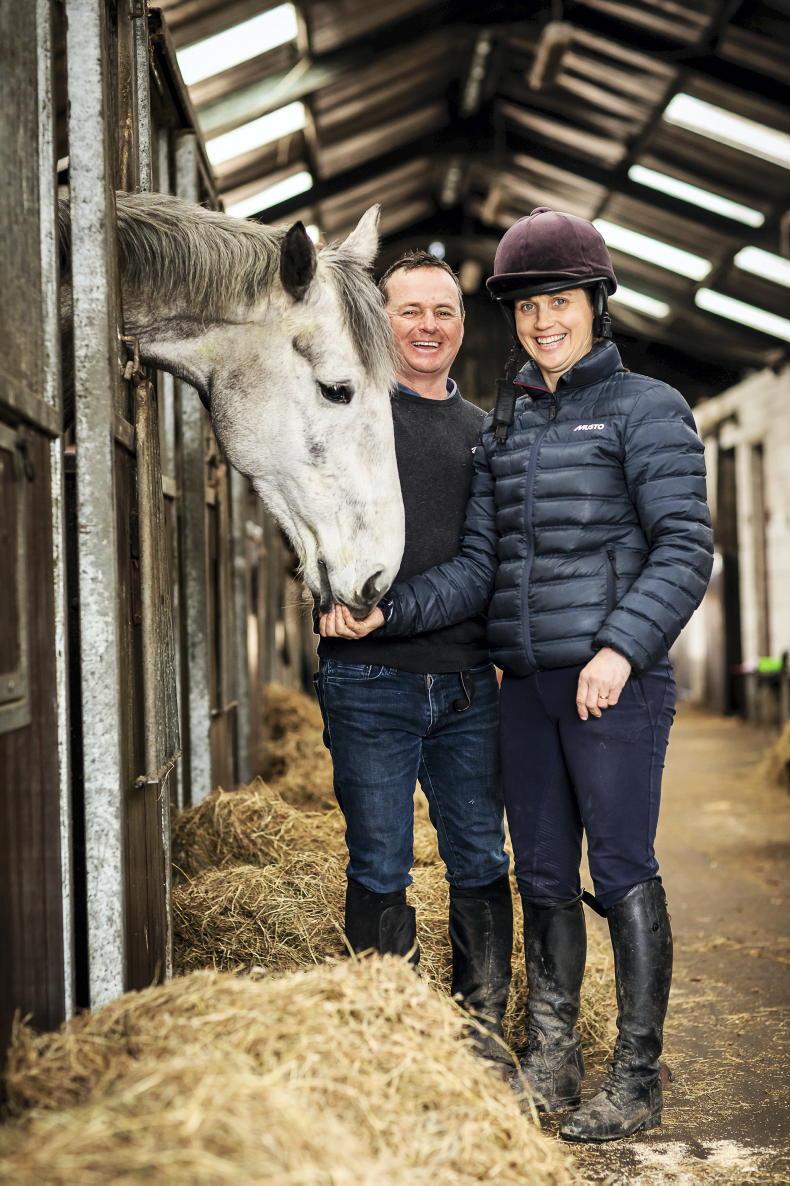
The business model
Charlie took the opportunity then to exit dairy, selling the quota, paying off debt, building up a herd of sucklers and increasing the horses. As a master of Kildare hunt, a large part of his business was hiring out horses for hunting.
When Daragh returned in 1999, he knew that some changes were needed to secure the future of the business. He took responsibility for the relationship with the K Club, whereby the O’Neills do all the outdoor pursuits (horse riding, clay pigeon shooting, archery and air rifle) for the world-famous hotel.
He admits he was never comfortable hiring out horses for hunting because of both the turnover rate of the horses and the injuries outweighing the financial gain.
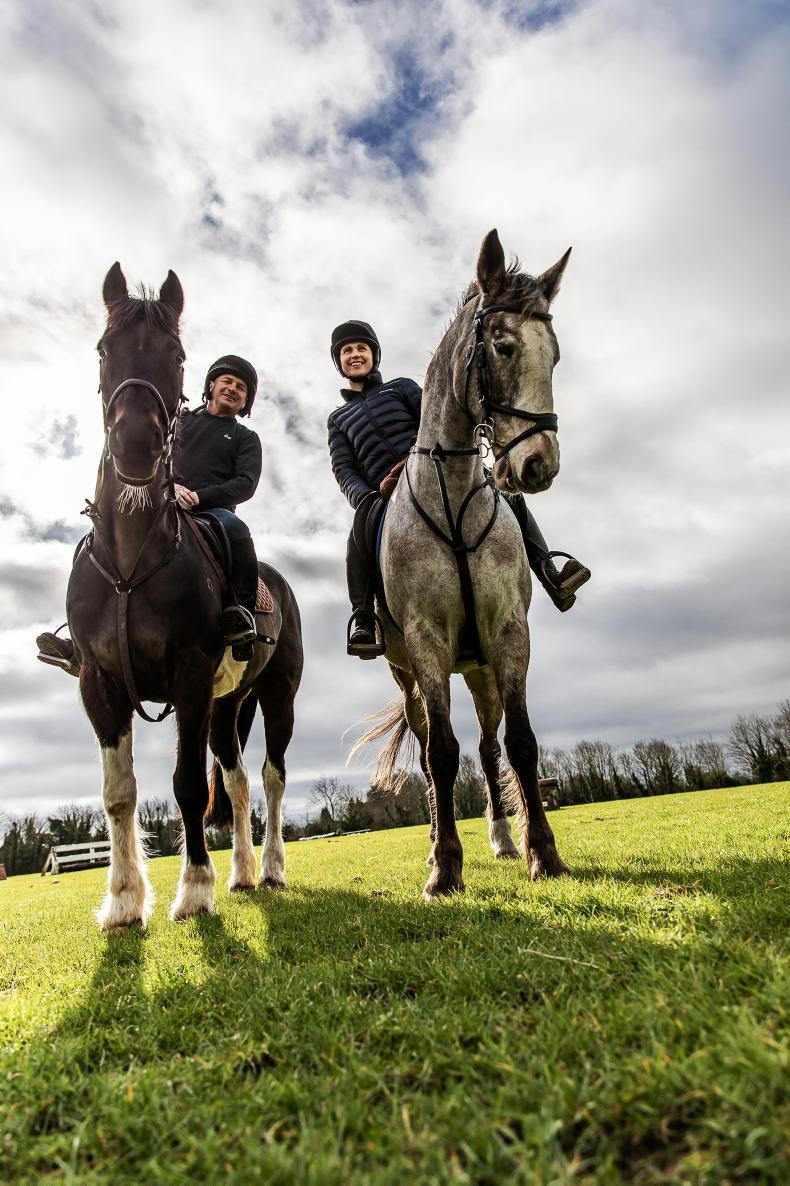
“Those [hunting] liveries went out in summer and were charged half-nothing and, heaven forbid, in winter, if there was no hunting for two weeks, there was nothing coming in at all. I needed that rainy day back-up plan and that was the liveries.”
The business is a different model to other riding establishments: “We were aware that horse riding was something people try for the first time and it’s exciting getting up, but you are bored after 10 minutes head to tail [in an arena] no communication with you and the horse, you just followed the leader up in front and that was it.”
Keen to offer a different experience, the O’Neills want to see riders doing a confident rising trot at the end of the session. “We take great pride in that – we don’t want to take your €45 and you leave bored at the end of the hour.”
Over time the yard liveries have grown organically. Most started out on weekly ride outs until such time as Daragh tells me “You give them a little nudge; ‘Time you got a horse’”.
Overcoming challenge, together
Daragh and Gráinne have just finished paying off debts that came with the farm. On this, Daragh is altruistic.
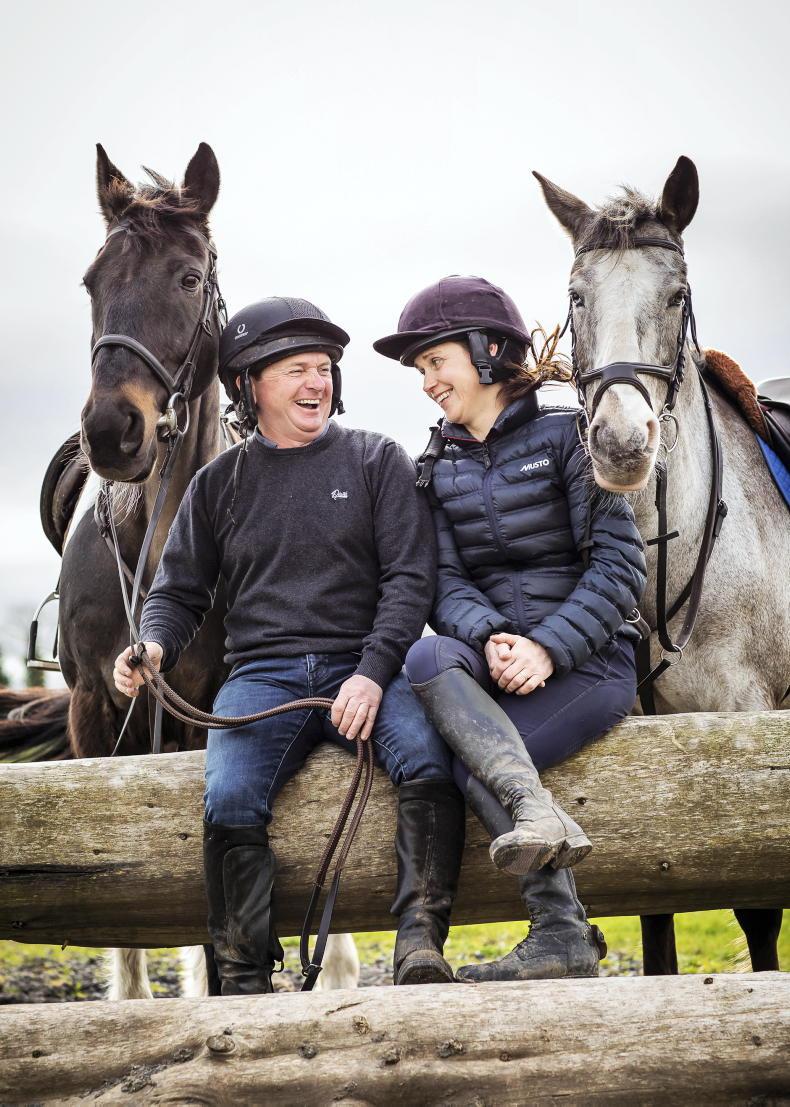
“We inherited those, myself and Gra, and it was all done in the best wishes. But it was a great challenge and I will never ever regret having to handle that as it built us; taking on that challenge.”
This has given room for reflection also, Daragh tells us: “At the beginning of last year’s COVID, we worked out that we were the busiest fools in the country. We used to think, if we didn’t go fast enough, the banks and the tax man would catch up with us and we would have nothing in our pocket. And then it all stopped. There was nothing coming in, we just had the liveries and we took a deep breath and said ‘Hold on, we are not going broke here’.”
Family farming
Of the 220ac, 40ac is let on a barter system to the next-door neighbour who grows barley, wheat or oats. Oats and straw come back into Abbeyfield. Fifty five acres are put into meadow for haylage, which Daragh used to cut himself up to two years ago. A contractor now does this work simply on economics.
“If I had to say no to a group that wanted to come in shooting or riding because I was baling, well, there was a couple hundred euro gone out the door.”
The rest of the land is all pasture with all horses out from 1 May. Paddocks are divided into fields of 12-15ac with a horse stocked 1-1.3/ac. Paddocks are limed every other year and fertiliser kept to a minimum with one cover in April.
Any farmer with a few horses will know that they sour ground and livestock have proven to be the solution at Abbeyfield.
“Horses are the fussiest animals and leave so much behind. Beef farmers would cry looking at what we are topping. Last year, my son Harry convinced me to get a few head of cattle. I was apprehensive as – when we did carry weanlings – they did my head in, hard to manage and no money in it. One horse would have paid for the profit of five calves.”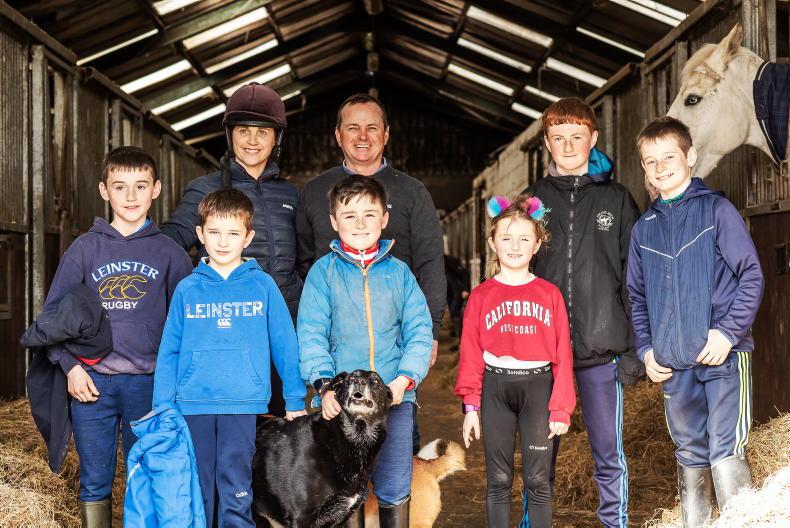
The whole family – brothers, sister, nephews and nieces – have all banded together to keep Abbeyfield Farm afloat during the pandemic . \ Philip Doyle
Harry’s persistence paid off and last April, 10 Hereford and Limousin cross calves arrived. Harry (18) bought five, Katie (15) bought two, Susie (13) bought two and Danny (10) bought one.
Although there were benefits for the children, Daragh explains that the idea is to have a “lawnmower” that will eat this grass down that the horses leave behind. “The test was that under no circumstances could they come in. After three months, they went out and couldn’t come in again. And everything went brilliantly, they will be sold in September,” he says.
The success of the “lawnmowers” will see 20 more arrive from a dairy-farming friend that Daragh knows since Warrenstown. An additional advantage was that Harry utilised the knowledge he garnered on cattle finishing up horse leftovers for his Leaving Cert ag science project.
Making it work
During the first lockdown, the O’Neills – like so many other business owners – didn’t know what was going to happen. All their staff had to be let go, but all the horses were still in.
“On this farm, my mother lives here with two of my brothers. David, my other brother, unfortunately passed away within five weeks of my father Charlie, but his wife Sonia and their two boys live here.”
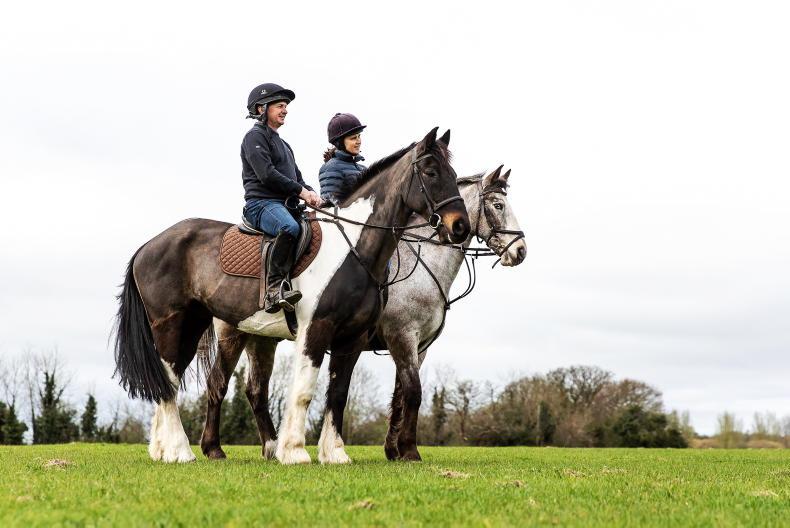
A decision was made: “So we decided as a family of four houses that we would make our bubble because horses still had to be exercised. We had 11 grandkids and five or six brothers and sisters riding out every morning, running the place and it was just brilliant. We are very lucky that the farm is set up the way it is; a family farm.”
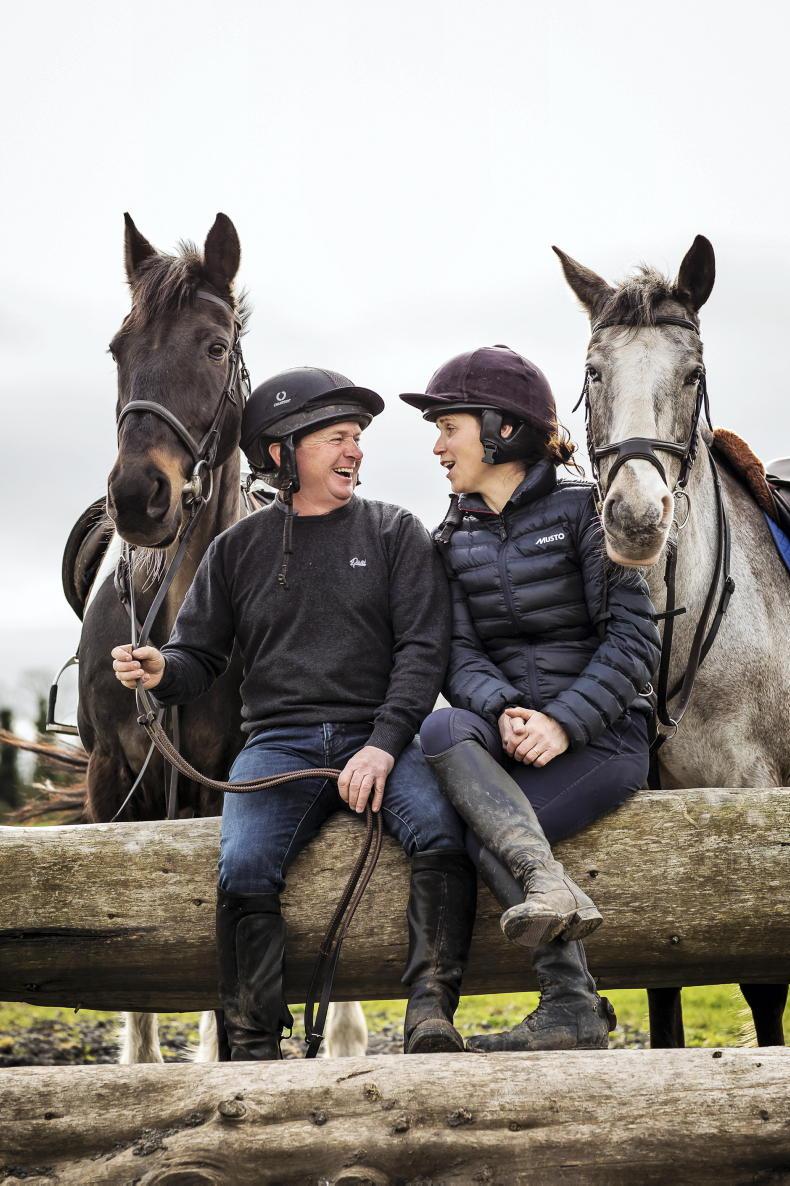
Clear communication is key to a good work culture, according to Daragh. They operate a very clear rule, which he says works very simply: “If you have a problem and you don’t tell me, I can’t solve it. Open your mouth, don’t be down the complaints department killing the whole vibe of the place.”
About nine years ago, Daragh, conscious of more people coming in for shooting, wanted to improve the appearance of the yard so he applied for a grant through Kildare LEADER.
“Although it nearly killed me as you couldn’t get a penny back until you had everything paid for, it was great. I have looked at other things, but sometimes they can be a year or two down the track. If I want to do something I want to get on with it.”
Motivation for Daragh was originally to be the provider, but now it is about providing to enjoy life. And having Gráinne with him is a major component of that. He says: “The kids are at an age now where she is not running from there to here picking up. She is with me at 8am every morning and I couldn’t do this now without her. She gives me nudges [in cases] where I am a bit laid back. She is very intuitive about what the business needs which I can sometimes miss.”
Daragh’s brother Alan’s role is vital too, he says: “It is mine and Gráinne’s farm, but myself, Gráinne and Alan work as a team. He manages the gun shoot, which is almost 50% of the business now.”
In terms of future succession, Harry is riding a few point to points and intends to study agriculture in Waterford IT. “For my kids, I want them to see the world and come back at 25/30 years of age and we can see what we will do with the farm”.
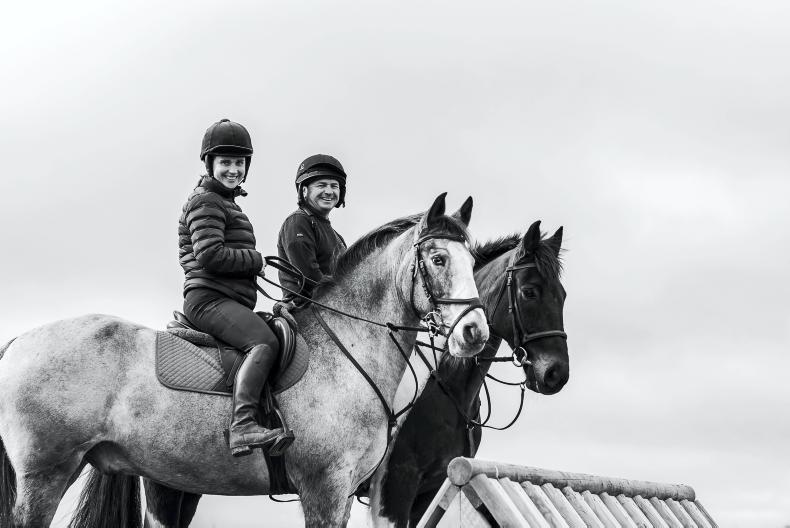
“Find out what you love first. Don’t let that love disappear because the banks are on your back, Borrow what you know you can handle.” “Build steady and securely.” “Be conscious of the environment. I am looking to see if we can heat the water under the manure, as the heat that generates is enormous. We are putting in beehives this summer. I have gone mad on birds since I spotted a kingfisher a few years ago. I have now spotted 48 species of birds on the farm.” For Daragh, a big failing for those in business is trying to do too much and taking on too much. He warns against letting your whole life be consumed because you are going too fast to keep up with all the wheels that have to keep turning.
“The family set up. That is my proudest thing, that we have not fallen out, that we have been able to work things out and get on with it.”
When relationships falter and people fall out and start to give out about each other, Daragh believes that sometimes this can be due to people having a “lot of trouble on their back”, that others don’t see. Their [people with worries] communication levels have gone to the floor; “It’s the biggest fall back of the human race, we don’t have the compassion, to actually listen to people when we should, rather than thinking the worst.
Read more
Cullen Nurseries: 'I’d say 70% of our business is with farmers'
Walking the path of ‘marrying-into a farm’
Sounds punctuate the conversation. The tap, tap, tap, “ye-yup, stand up!” of the farrier as he works; children laughing; stable doors creaking open; and the four-step gait of the horses echoing as they go in and out
Abbeyfield Farm feels “normal” in its busy-ness. And that is permitted, as livery owners are – by law – allowed to travel to look after the welfare of their horse(s) during COVID-19 restrictions.
Proprietors, Daragh and Gráinne O’Neill explain that there are of course precautions, set groups and social distancing but, there is a normality nonetheless.
Gráinne and Daragh
Daragh O’Neill is the third generation to farm at Abbeyfield Farm, Clane, Co Kildare. “My Grandfather bought this land in 1938 – sheep farming initially and then milking.”

Daragh is the third generation of his family to farm at Abbeyfield. \ Philip Doyle
The second generation, Charlie (Daragh’s father) started farming when, Daragh explains “my grandfather had a stroke and Dad left school before his Inter Cert, never went back. He had to pay for his brothers and sisters and the guaranteed thing was the milk cheque.”
By the time, Daragh was 17, they had a nice herd of 120 cows, but he knows that his father never loved it. “If Dad was here today, he would tell you that. His love was horses and interacting with people, that was where his strengths were.”
Daragh studied at Warrenstown Agricultural College, before going on to the National Stud. His father did ask if he was interested in dairying but Daragh’s passion was no more in cows than his fathers was, so in the summer of 1989, 10 days after finishing in the National Stud, he left for Australia’s Hunter Valley which is also where he met Gráinne in 1998.
The business model
Charlie took the opportunity then to exit dairy, selling the quota, paying off debt, building up a herd of sucklers and increasing the horses. As a master of Kildare hunt, a large part of his business was hiring out horses for hunting.
When Daragh returned in 1999, he knew that some changes were needed to secure the future of the business. He took responsibility for the relationship with the K Club, whereby the O’Neills do all the outdoor pursuits (horse riding, clay pigeon shooting, archery and air rifle) for the world-famous hotel.
He admits he was never comfortable hiring out horses for hunting because of both the turnover rate of the horses and the injuries outweighing the financial gain.

“Those [hunting] liveries went out in summer and were charged half-nothing and, heaven forbid, in winter, if there was no hunting for two weeks, there was nothing coming in at all. I needed that rainy day back-up plan and that was the liveries.”
The business is a different model to other riding establishments: “We were aware that horse riding was something people try for the first time and it’s exciting getting up, but you are bored after 10 minutes head to tail [in an arena] no communication with you and the horse, you just followed the leader up in front and that was it.”
Keen to offer a different experience, the O’Neills want to see riders doing a confident rising trot at the end of the session. “We take great pride in that – we don’t want to take your €45 and you leave bored at the end of the hour.”
Over time the yard liveries have grown organically. Most started out on weekly ride outs until such time as Daragh tells me “You give them a little nudge; ‘Time you got a horse’”.
Overcoming challenge, together
Daragh and Gráinne have just finished paying off debts that came with the farm. On this, Daragh is altruistic.

“We inherited those, myself and Gra, and it was all done in the best wishes. But it was a great challenge and I will never ever regret having to handle that as it built us; taking on that challenge.”
This has given room for reflection also, Daragh tells us: “At the beginning of last year’s COVID, we worked out that we were the busiest fools in the country. We used to think, if we didn’t go fast enough, the banks and the tax man would catch up with us and we would have nothing in our pocket. And then it all stopped. There was nothing coming in, we just had the liveries and we took a deep breath and said ‘Hold on, we are not going broke here’.”
Family farming
Of the 220ac, 40ac is let on a barter system to the next-door neighbour who grows barley, wheat or oats. Oats and straw come back into Abbeyfield. Fifty five acres are put into meadow for haylage, which Daragh used to cut himself up to two years ago. A contractor now does this work simply on economics.
“If I had to say no to a group that wanted to come in shooting or riding because I was baling, well, there was a couple hundred euro gone out the door.”
The rest of the land is all pasture with all horses out from 1 May. Paddocks are divided into fields of 12-15ac with a horse stocked 1-1.3/ac. Paddocks are limed every other year and fertiliser kept to a minimum with one cover in April.
Any farmer with a few horses will know that they sour ground and livestock have proven to be the solution at Abbeyfield.
“Horses are the fussiest animals and leave so much behind. Beef farmers would cry looking at what we are topping. Last year, my son Harry convinced me to get a few head of cattle. I was apprehensive as – when we did carry weanlings – they did my head in, hard to manage and no money in it. One horse would have paid for the profit of five calves.”
The whole family – brothers, sister, nephews and nieces – have all banded together to keep Abbeyfield Farm afloat during the pandemic . \ Philip Doyle
Harry’s persistence paid off and last April, 10 Hereford and Limousin cross calves arrived. Harry (18) bought five, Katie (15) bought two, Susie (13) bought two and Danny (10) bought one.
Although there were benefits for the children, Daragh explains that the idea is to have a “lawnmower” that will eat this grass down that the horses leave behind. “The test was that under no circumstances could they come in. After three months, they went out and couldn’t come in again. And everything went brilliantly, they will be sold in September,” he says.
The success of the “lawnmowers” will see 20 more arrive from a dairy-farming friend that Daragh knows since Warrenstown. An additional advantage was that Harry utilised the knowledge he garnered on cattle finishing up horse leftovers for his Leaving Cert ag science project.
Making it work
During the first lockdown, the O’Neills – like so many other business owners – didn’t know what was going to happen. All their staff had to be let go, but all the horses were still in.
“On this farm, my mother lives here with two of my brothers. David, my other brother, unfortunately passed away within five weeks of my father Charlie, but his wife Sonia and their two boys live here.”

A decision was made: “So we decided as a family of four houses that we would make our bubble because horses still had to be exercised. We had 11 grandkids and five or six brothers and sisters riding out every morning, running the place and it was just brilliant. We are very lucky that the farm is set up the way it is; a family farm.”

Clear communication is key to a good work culture, according to Daragh. They operate a very clear rule, which he says works very simply: “If you have a problem and you don’t tell me, I can’t solve it. Open your mouth, don’t be down the complaints department killing the whole vibe of the place.”
About nine years ago, Daragh, conscious of more people coming in for shooting, wanted to improve the appearance of the yard so he applied for a grant through Kildare LEADER.
“Although it nearly killed me as you couldn’t get a penny back until you had everything paid for, it was great. I have looked at other things, but sometimes they can be a year or two down the track. If I want to do something I want to get on with it.”
Motivation for Daragh was originally to be the provider, but now it is about providing to enjoy life. And having Gráinne with him is a major component of that. He says: “The kids are at an age now where she is not running from there to here picking up. She is with me at 8am every morning and I couldn’t do this now without her. She gives me nudges [in cases] where I am a bit laid back. She is very intuitive about what the business needs which I can sometimes miss.”
Daragh’s brother Alan’s role is vital too, he says: “It is mine and Gráinne’s farm, but myself, Gráinne and Alan work as a team. He manages the gun shoot, which is almost 50% of the business now.”
In terms of future succession, Harry is riding a few point to points and intends to study agriculture in Waterford IT. “For my kids, I want them to see the world and come back at 25/30 years of age and we can see what we will do with the farm”.

“Find out what you love first. Don’t let that love disappear because the banks are on your back, Borrow what you know you can handle.” “Build steady and securely.” “Be conscious of the environment. I am looking to see if we can heat the water under the manure, as the heat that generates is enormous. We are putting in beehives this summer. I have gone mad on birds since I spotted a kingfisher a few years ago. I have now spotted 48 species of birds on the farm.” For Daragh, a big failing for those in business is trying to do too much and taking on too much. He warns against letting your whole life be consumed because you are going too fast to keep up with all the wheels that have to keep turning.
“The family set up. That is my proudest thing, that we have not fallen out, that we have been able to work things out and get on with it.”
When relationships falter and people fall out and start to give out about each other, Daragh believes that sometimes this can be due to people having a “lot of trouble on their back”, that others don’t see. Their [people with worries] communication levels have gone to the floor; “It’s the biggest fall back of the human race, we don’t have the compassion, to actually listen to people when we should, rather than thinking the worst.
Read more
Cullen Nurseries: 'I’d say 70% of our business is with farmers'
Walking the path of ‘marrying-into a farm’












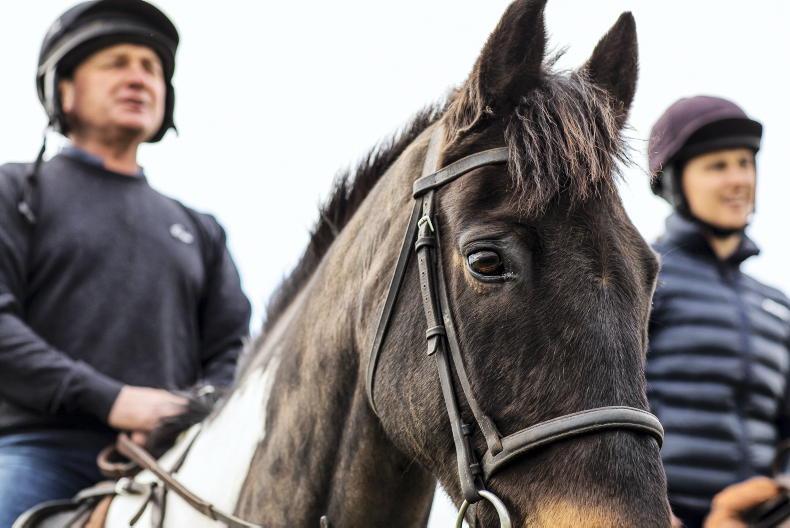



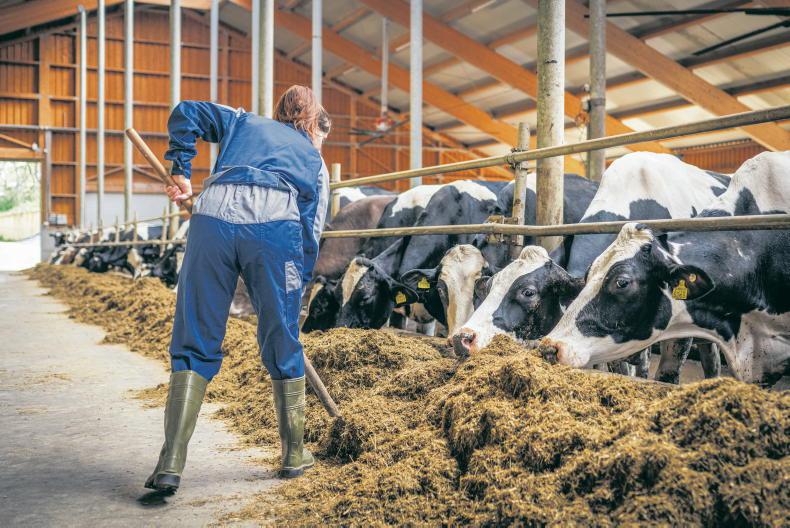
SHARING OPTIONS